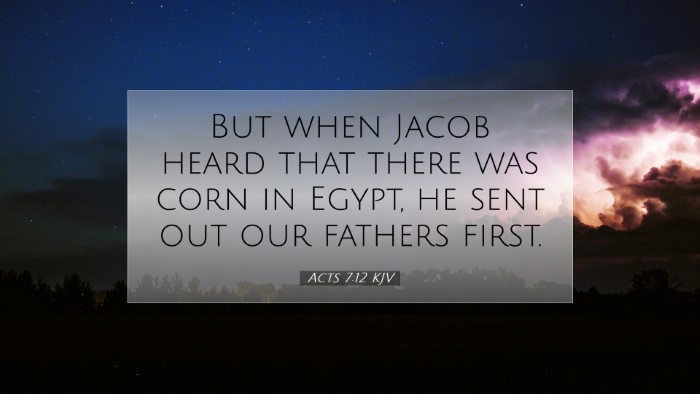Commentary on Acts 7:12
Acts 7:12 states: "But when Jacob heard that there was corn in Egypt, he sent out our fathers first." This verse is significant as it unfolds the providential dealings of God with His people and lays the groundwork for understanding the broader narrative of Israel's history and their eventual deliverance.
Context of Acts 7
In this chapter, Stephen is delivering a defense against the accusations of blasphemy. He recounts the history of Israel to illustrate their pattern of rejecting God's messengers and preparation for the ultimate act of rejection—crucifying Christ. The reference to Jacob and his sons draws attention to a pivotal moment in Israel's history that echoes the profound themes of providence, sustenance, and God's overarching plan.
Insights from Public Domain Commentaries
Matthew Henry's Commentary
Matthew Henry emphasizes that Jacob's decision to send his sons to Egypt for sustenance was rooted in his desperation. The famine had struck Canaan, and the news of corn in Egypt presented a necessary hope. Henry notes that this was not merely a physical journey but a significant spiritual moment in the lineage of the Israelites, underlining God's provision even in difficult times.
Moreover, Henry points out the implication of "sent out our fathers first". It illustrates a sequence of actions initiated by God’s providence, where He preordained the steps leading to the settlement in Egypt—a direct result of Jacob's faithful response to need.
Albert Barnes' Notes on the Bible
Barnes expands on the implications of Jacob’s sending his sons to Egypt. He reflects on the historical and theological significance of this event, noting that it sets the stage for the Israelites' eventual enslavement. This movement to Egypt was divinely orchestrated to fulfill the earlier promises made to Abraham, Isaac, and Jacob regarding their descendants. Barnes emphasizes that this verse serves as a reminder of how God often uses situations of despair to manifest His divine plans.
Furthermore, he makes a critical observation about the familial aspect of this verse, signifying how God works through family units to accomplish His purposes. It was through the very act of Jacob sending his sons that the larger plan for the redemption through Christ would unfold, showing the interwoven fate of families and nations under God's sovereign control.
Adam Clarke's Commentary
Adam Clarke provides a meticulous examination of the historical context surrounding this event. He notes that the famine in Canaan reveals the precarious condition of the Israelites, setting a stark contrast to the providence of God illustrated through Egypt’s abundance. Clarke also suggests that Jacob's action in sending his sons exemplifies both human initiative in the face of crisis and faith in the divine provision.
In his analysis, Clarke emphasizes the importance of this moment in the narrative of Acts, linking it to the broader story of God's covenant with His people. Clarke’s insights highlight how such historical instances reinforce the steadfastness of God's promises, as well as the faith required in His people during times of scarcity.
Theological Implications
This verse prompts deep theological reflection on God's providence. It illustrates that even in trials, such as famine, God is at work achieving His purposes. For pastors and theologians, this serves to reinforce the belief that God frequently uses adverse circumstances to bring His people into a space where He can provide for their needs—both physical and spiritual.
The act of sending his sons to Egypt emphasizes a collective response to need. It reflects an important communal principle that resonates with the early Church's unity and shared provision, which is echoed through the teachings of Jesus on care for one another (Acts 2:44-45).
Lessons for Today
This passage invites reflection on several lessons:
- The importance of responding to need: Jacob's action was a direct response to an immediate need, teaching us the importance of recognizing and addressing needs within our communities today.
- Trusting God in desperation: Just as Israel faced famine but found abundance in Egypt, believers are encouraged to trust God's provision even in our most challenging times.
- Understanding divine providence: The unfolding of these events underlines the fact that God's plans often require difficult circumstances to set the stage for His greater purpose in our lives.
Conclusion
Acts 7:12 is a powerful reminder of the providential hand of God guiding His people through the complexities of life. The insights from Matthew Henry, Albert Barnes, and Adam Clarke illuminate the richness of this moment in Jewish history and its implications for Christians today. This verse beckons the reader to contemplate the faithful responses that emerge in times of famine and desperation, ultimately leading to a greater understanding of God's eternal plan for salvation through Jesus Christ.


